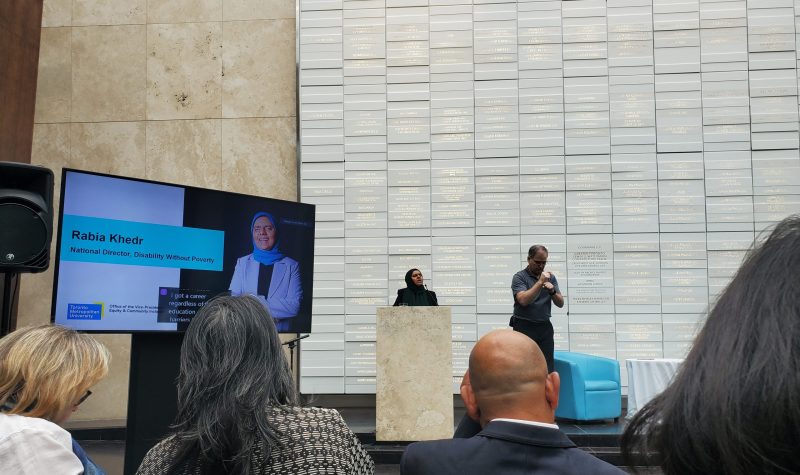Yesterday Toronto Metropolitan University (TMU) held an event to highlight and “champion” disability justice and human rights.
At the event, TMU’s Employees with Disabilities Community Network shared a short a film about the evolution of making the campus more accessible. The short film Across the Universe-City is being used by the network to educate people on the issues students and faculty face on campus.
“We took a collaborative and consensus based approach to create a short film with these goals in mind. One, to educate about the impacts of ableism and the importance of combating its effects. Two to increase the awareness of accessibility and the barriers on campus, as well as how to address them. Three, to empower employees with disabilities to seek out supports available on campus, and for to ignite community engagement, about accessibility and anti ableism as a shared responsibility,” says Yvonne Simpson, a curriculum specialists at TMU.
The event was held to commemorate two days that are important to the topic of disability and human rights: the International Day of Persons with Disabilities (Dec. 3) and Human Rights Day (Dec. 10).
This upcoming Human Rights Day marks the 75th anniversary of the Universal Declaration of Human Rights by the United Nations. Rabia Kehdar, national director of Disability Without Poverty and founder of Race and Disability Canada, spoke at TMU’s event. She says that with all of the commemorative days going on that this week is important.
“Language can give power and take power away. In fact, when it comes to disability, justice, equity and human rights, when we use inclusive language, it really fosters that feeling and reality of belonging and inclusion,” says Kehdar. “When TMU talks about equity, diversity and inclusion and brands it as equity and community inclusion. It has begun from that position of fostering belonging, because we're talking about community. Diversity is just a reality around us. So this week is very important.”
Statistics Canada released updated data Dec. 1 showing an increase in people living with disabilities. From 2017 to 2022, there was a five per cent increase of people with disabilities with currently “27 per cent of Canadians aged 15 years and older, or 8.0 million people, had one or more disabilities that limited them in their daily activities.”
Statistics Canada also found that in the same time period the people with disabilities were likely to be hired in 2022. They say that “62% of working-age adults with disabilities were employed, compared with 78% of persons without disabilities.” That is a three per cent increase from 2017.
Despite the increase in employment, Kehdar says there are still issues that need to be addressed, adding that 30 per cent of people with disabilities live below the poverty line. While Statistics Canada found 45 per cent of people with disabilities in Canada “reported difficulties in meeting their financial obligations due to the pandemic.”
“We're doing these little teeny tiny increases and debating whether they deserve more. Everybody wants to work every person with a disability wants to work. Some cannot due to the nature of their disability,” says Kehdar. “There needs to be a shift and that systems change will begin with the Canada disability benefit.”
Listen to the story below:


